Criminology 12 Essay: Australia and New Zealand Corruption Analysis
VerifiedAdded on 2022/08/13
|14
|3746
|20
Essay
AI Summary
This criminology essay delves into a comparative analysis of corruption in Australia and New Zealand, examining the differing approaches to combating corruption in both nations. The paper begins by tracing the historical context of corruption, highlighting its presence across various cultures and religions, and then proceeds to compare the anti-corruption agencies and their effectiveness. A key focus is the Corruption Perceptions Index (CPI) and its implications, particularly why New Zealand consistently scores lower than Australia. The essay also explores corruption in the real estate and banking sectors of both countries, discussing money laundering and the impact on housing. The analysis includes a discussion of the legal frameworks and the role of government initiatives in controlling corruption, ultimately concluding with a summary of the key points and their significance. The essay highlights that despite having more agencies, Australia struggles more with corruption. The essay also notes New Zealand's more comprehensive legal framework and strict penalties that contribute to its lower corruption levels.
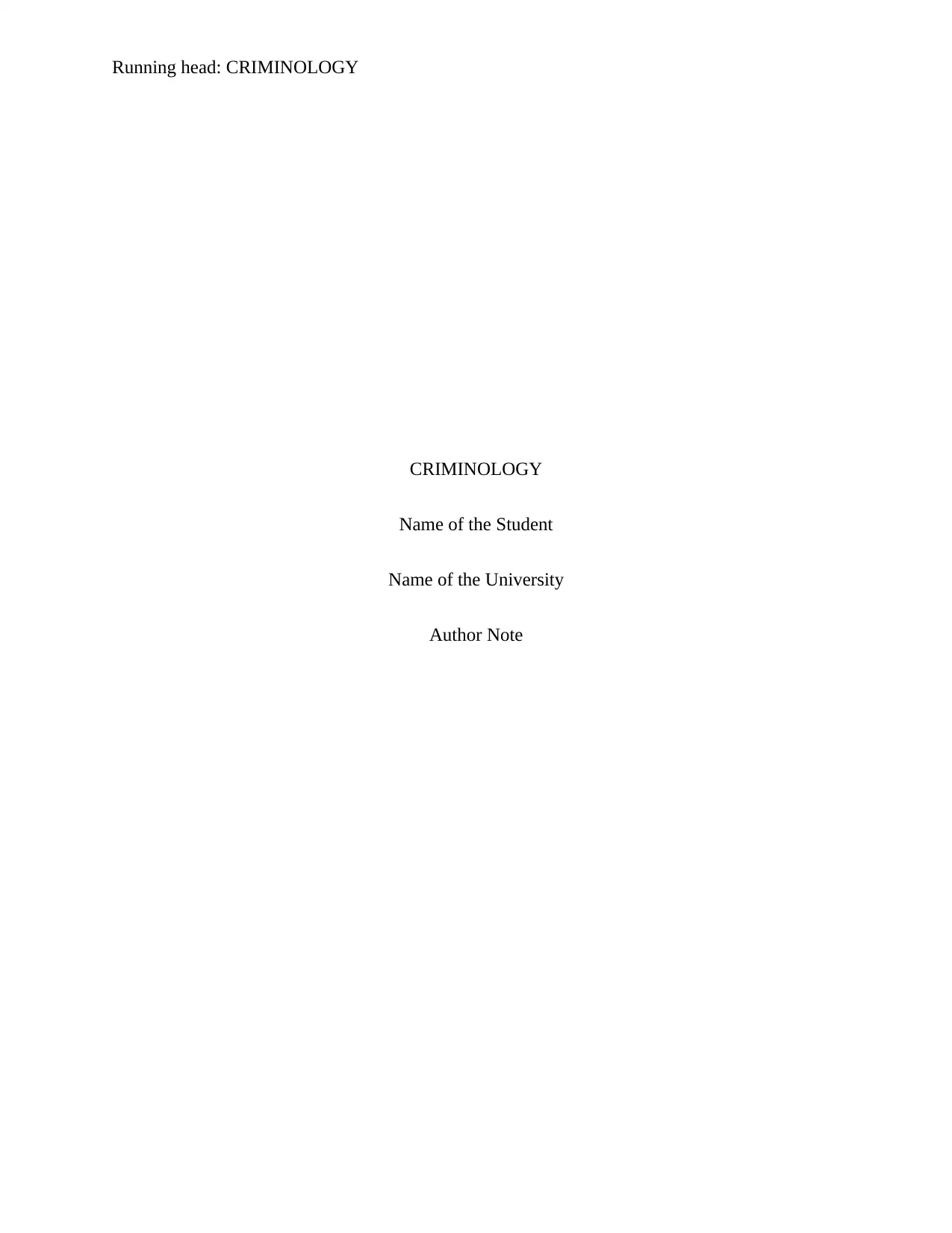
Running head: CRIMINOLOGY
CRIMINOLOGY
Name of the Student
Name of the University
Author Note
CRIMINOLOGY
Name of the Student
Name of the University
Author Note
Paraphrase This Document
Need a fresh take? Get an instant paraphrase of this document with our AI Paraphraser
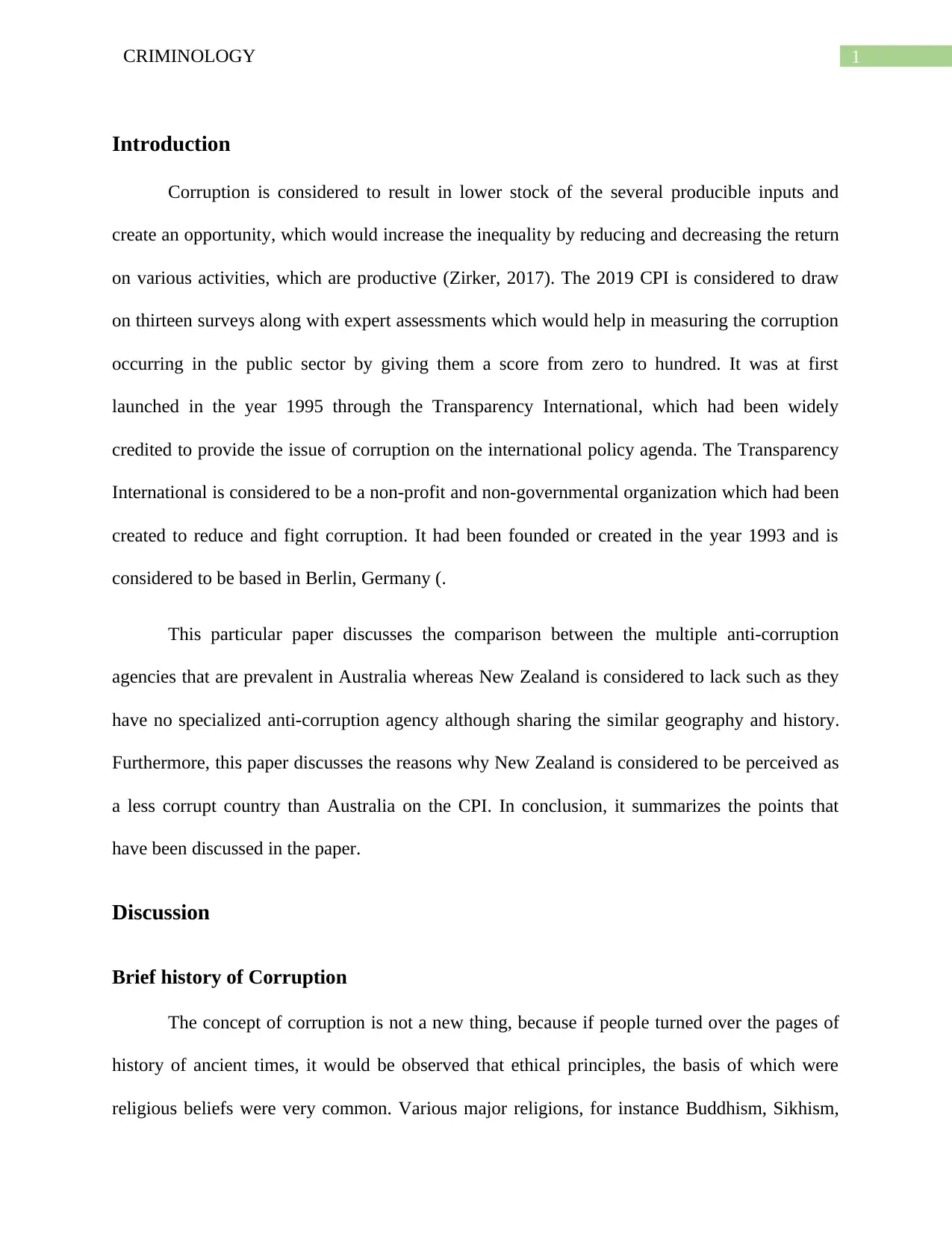
1CRIMINOLOGY
Introduction
Corruption is considered to result in lower stock of the several producible inputs and
create an opportunity, which would increase the inequality by reducing and decreasing the return
on various activities, which are productive (Zirker, 2017). The 2019 CPI is considered to draw
on thirteen surveys along with expert assessments which would help in measuring the corruption
occurring in the public sector by giving them a score from zero to hundred. It was at first
launched in the year 1995 through the Transparency International, which had been widely
credited to provide the issue of corruption on the international policy agenda. The Transparency
International is considered to be a non-profit and non-governmental organization which had been
created to reduce and fight corruption. It had been founded or created in the year 1993 and is
considered to be based in Berlin, Germany (.
This particular paper discusses the comparison between the multiple anti-corruption
agencies that are prevalent in Australia whereas New Zealand is considered to lack such as they
have no specialized anti-corruption agency although sharing the similar geography and history.
Furthermore, this paper discusses the reasons why New Zealand is considered to be perceived as
a less corrupt country than Australia on the CPI. In conclusion, it summarizes the points that
have been discussed in the paper.
Discussion
Brief history of Corruption
The concept of corruption is not a new thing, because if people turned over the pages of
history of ancient times, it would be observed that ethical principles, the basis of which were
religious beliefs were very common. Various major religions, for instance Buddhism, Sikhism,
Introduction
Corruption is considered to result in lower stock of the several producible inputs and
create an opportunity, which would increase the inequality by reducing and decreasing the return
on various activities, which are productive (Zirker, 2017). The 2019 CPI is considered to draw
on thirteen surveys along with expert assessments which would help in measuring the corruption
occurring in the public sector by giving them a score from zero to hundred. It was at first
launched in the year 1995 through the Transparency International, which had been widely
credited to provide the issue of corruption on the international policy agenda. The Transparency
International is considered to be a non-profit and non-governmental organization which had been
created to reduce and fight corruption. It had been founded or created in the year 1993 and is
considered to be based in Berlin, Germany (.
This particular paper discusses the comparison between the multiple anti-corruption
agencies that are prevalent in Australia whereas New Zealand is considered to lack such as they
have no specialized anti-corruption agency although sharing the similar geography and history.
Furthermore, this paper discusses the reasons why New Zealand is considered to be perceived as
a less corrupt country than Australia on the CPI. In conclusion, it summarizes the points that
have been discussed in the paper.
Discussion
Brief history of Corruption
The concept of corruption is not a new thing, because if people turned over the pages of
history of ancient times, it would be observed that ethical principles, the basis of which were
religious beliefs were very common. Various major religions, for instance Buddhism, Sikhism,
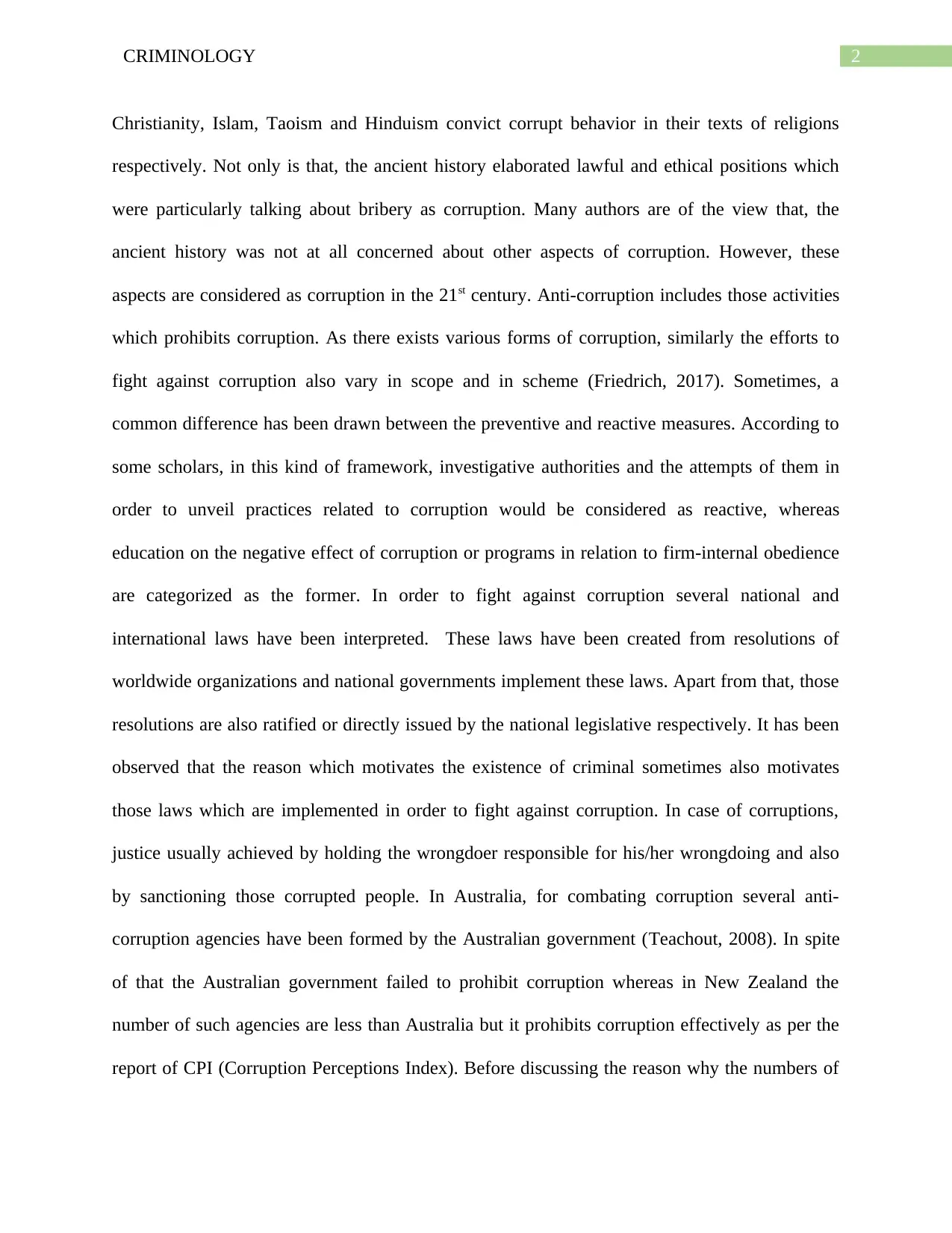
2CRIMINOLOGY
Christianity, Islam, Taoism and Hinduism convict corrupt behavior in their texts of religions
respectively. Not only is that, the ancient history elaborated lawful and ethical positions which
were particularly talking about bribery as corruption. Many authors are of the view that, the
ancient history was not at all concerned about other aspects of corruption. However, these
aspects are considered as corruption in the 21st century. Anti-corruption includes those activities
which prohibits corruption. As there exists various forms of corruption, similarly the efforts to
fight against corruption also vary in scope and in scheme (Friedrich, 2017). Sometimes, a
common difference has been drawn between the preventive and reactive measures. According to
some scholars, in this kind of framework, investigative authorities and the attempts of them in
order to unveil practices related to corruption would be considered as reactive, whereas
education on the negative effect of corruption or programs in relation to firm-internal obedience
are categorized as the former. In order to fight against corruption several national and
international laws have been interpreted. These laws have been created from resolutions of
worldwide organizations and national governments implement these laws. Apart from that, those
resolutions are also ratified or directly issued by the national legislative respectively. It has been
observed that the reason which motivates the existence of criminal sometimes also motivates
those laws which are implemented in order to fight against corruption. In case of corruptions,
justice usually achieved by holding the wrongdoer responsible for his/her wrongdoing and also
by sanctioning those corrupted people. In Australia, for combating corruption several anti-
corruption agencies have been formed by the Australian government (Teachout, 2008). In spite
of that the Australian government failed to prohibit corruption whereas in New Zealand the
number of such agencies are less than Australia but it prohibits corruption effectively as per the
report of CPI (Corruption Perceptions Index). Before discussing the reason why the numbers of
Christianity, Islam, Taoism and Hinduism convict corrupt behavior in their texts of religions
respectively. Not only is that, the ancient history elaborated lawful and ethical positions which
were particularly talking about bribery as corruption. Many authors are of the view that, the
ancient history was not at all concerned about other aspects of corruption. However, these
aspects are considered as corruption in the 21st century. Anti-corruption includes those activities
which prohibits corruption. As there exists various forms of corruption, similarly the efforts to
fight against corruption also vary in scope and in scheme (Friedrich, 2017). Sometimes, a
common difference has been drawn between the preventive and reactive measures. According to
some scholars, in this kind of framework, investigative authorities and the attempts of them in
order to unveil practices related to corruption would be considered as reactive, whereas
education on the negative effect of corruption or programs in relation to firm-internal obedience
are categorized as the former. In order to fight against corruption several national and
international laws have been interpreted. These laws have been created from resolutions of
worldwide organizations and national governments implement these laws. Apart from that, those
resolutions are also ratified or directly issued by the national legislative respectively. It has been
observed that the reason which motivates the existence of criminal sometimes also motivates
those laws which are implemented in order to fight against corruption. In case of corruptions,
justice usually achieved by holding the wrongdoer responsible for his/her wrongdoing and also
by sanctioning those corrupted people. In Australia, for combating corruption several anti-
corruption agencies have been formed by the Australian government (Teachout, 2008). In spite
of that the Australian government failed to prohibit corruption whereas in New Zealand the
number of such agencies are less than Australia but it prohibits corruption effectively as per the
report of CPI (Corruption Perceptions Index). Before discussing the reason why the numbers of
⊘ This is a preview!⊘
Do you want full access?
Subscribe today to unlock all pages.

Trusted by 1+ million students worldwide
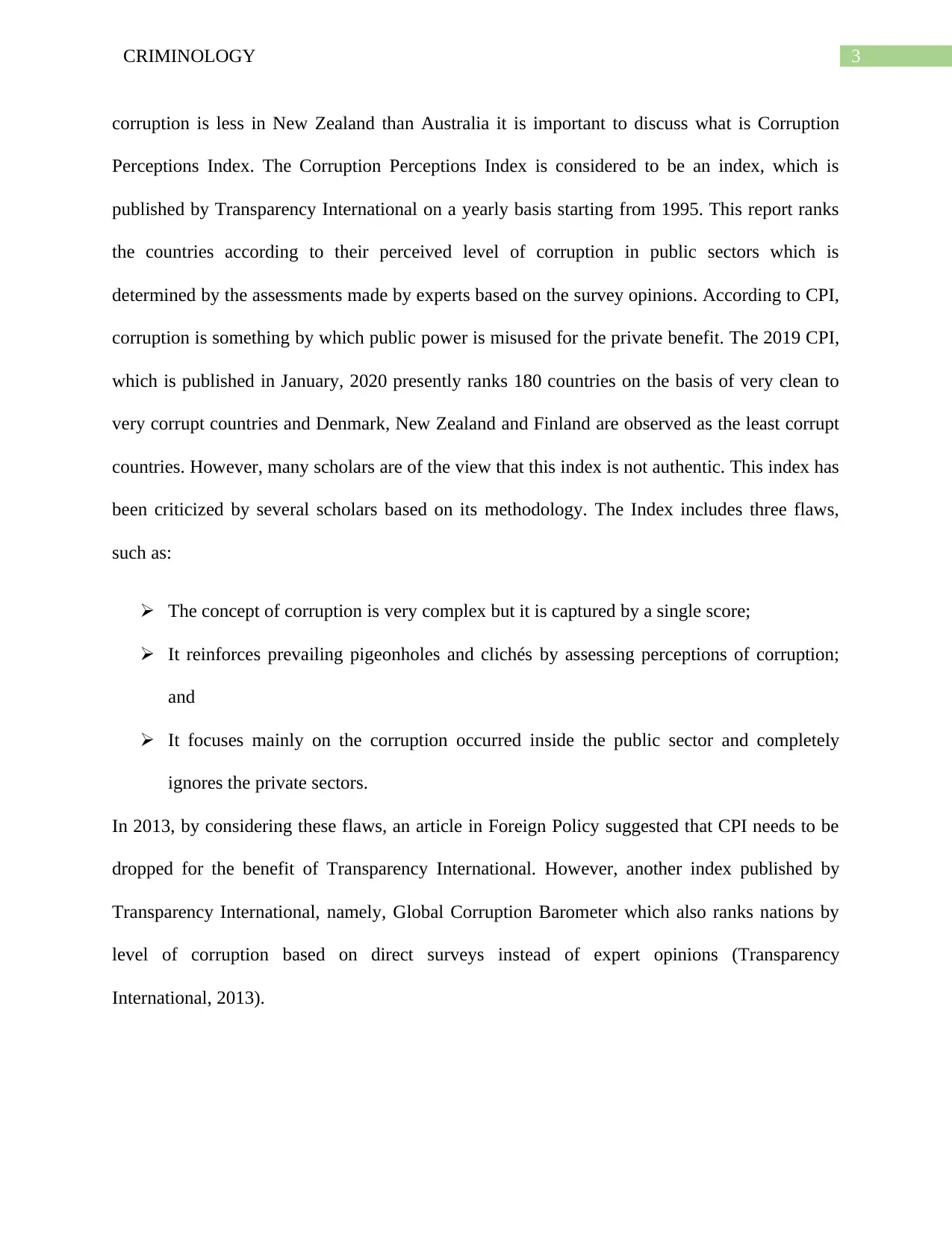
3CRIMINOLOGY
corruption is less in New Zealand than Australia it is important to discuss what is Corruption
Perceptions Index. The Corruption Perceptions Index is considered to be an index, which is
published by Transparency International on a yearly basis starting from 1995. This report ranks
the countries according to their perceived level of corruption in public sectors which is
determined by the assessments made by experts based on the survey opinions. According to CPI,
corruption is something by which public power is misused for the private benefit. The 2019 CPI,
which is published in January, 2020 presently ranks 180 countries on the basis of very clean to
very corrupt countries and Denmark, New Zealand and Finland are observed as the least corrupt
countries. However, many scholars are of the view that this index is not authentic. This index has
been criticized by several scholars based on its methodology. The Index includes three flaws,
such as:
The concept of corruption is very complex but it is captured by a single score;
It reinforces prevailing pigeonholes and clichés by assessing perceptions of corruption;
and
It focuses mainly on the corruption occurred inside the public sector and completely
ignores the private sectors.
In 2013, by considering these flaws, an article in Foreign Policy suggested that CPI needs to be
dropped for the benefit of Transparency International. However, another index published by
Transparency International, namely, Global Corruption Barometer which also ranks nations by
level of corruption based on direct surveys instead of expert opinions (Transparency
International, 2013).
corruption is less in New Zealand than Australia it is important to discuss what is Corruption
Perceptions Index. The Corruption Perceptions Index is considered to be an index, which is
published by Transparency International on a yearly basis starting from 1995. This report ranks
the countries according to their perceived level of corruption in public sectors which is
determined by the assessments made by experts based on the survey opinions. According to CPI,
corruption is something by which public power is misused for the private benefit. The 2019 CPI,
which is published in January, 2020 presently ranks 180 countries on the basis of very clean to
very corrupt countries and Denmark, New Zealand and Finland are observed as the least corrupt
countries. However, many scholars are of the view that this index is not authentic. This index has
been criticized by several scholars based on its methodology. The Index includes three flaws,
such as:
The concept of corruption is very complex but it is captured by a single score;
It reinforces prevailing pigeonholes and clichés by assessing perceptions of corruption;
and
It focuses mainly on the corruption occurred inside the public sector and completely
ignores the private sectors.
In 2013, by considering these flaws, an article in Foreign Policy suggested that CPI needs to be
dropped for the benefit of Transparency International. However, another index published by
Transparency International, namely, Global Corruption Barometer which also ranks nations by
level of corruption based on direct surveys instead of expert opinions (Transparency
International, 2013).
Paraphrase This Document
Need a fresh take? Get an instant paraphrase of this document with our AI Paraphraser
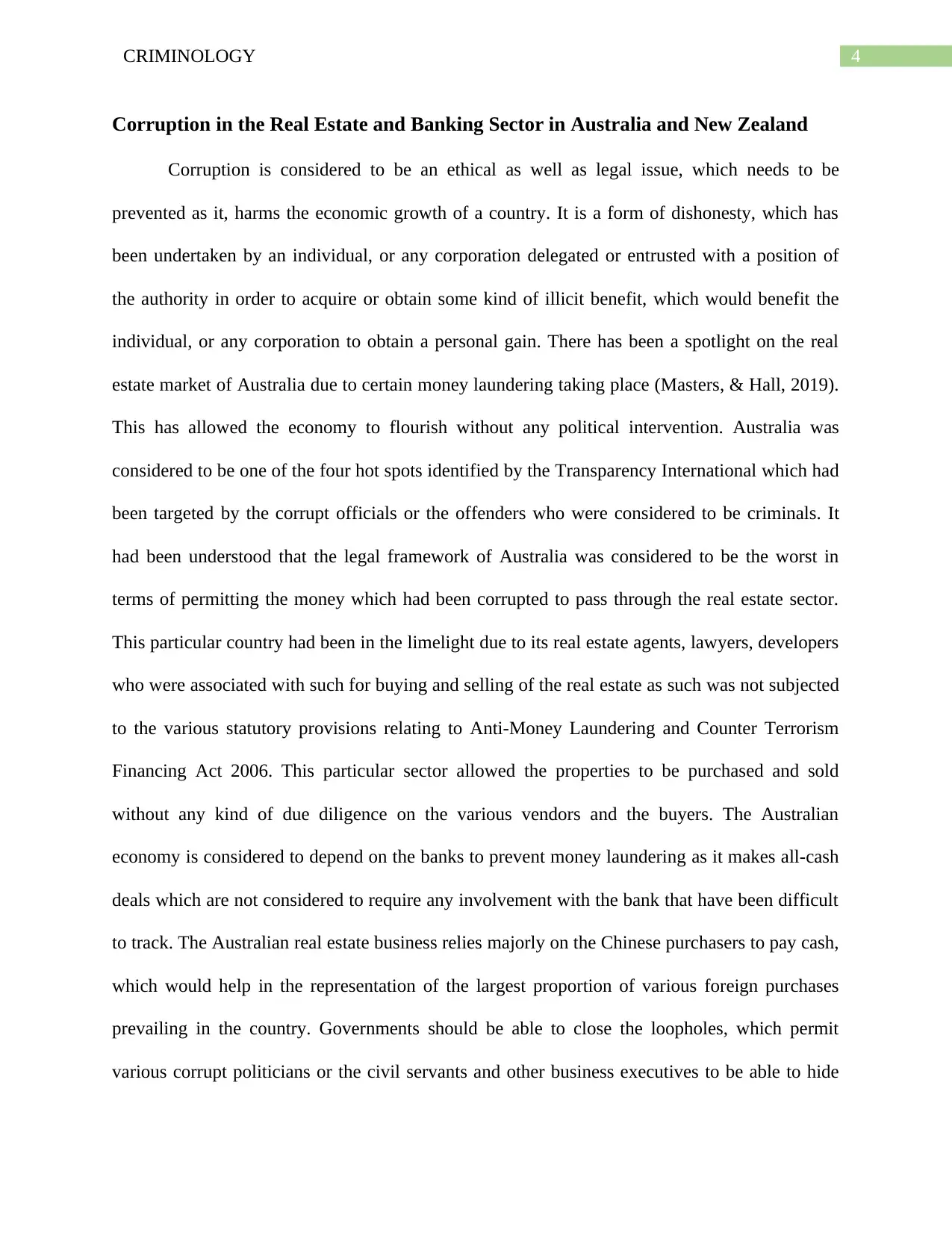
4CRIMINOLOGY
Corruption in the Real Estate and Banking Sector in Australia and New Zealand
Corruption is considered to be an ethical as well as legal issue, which needs to be
prevented as it, harms the economic growth of a country. It is a form of dishonesty, which has
been undertaken by an individual, or any corporation delegated or entrusted with a position of
the authority in order to acquire or obtain some kind of illicit benefit, which would benefit the
individual, or any corporation to obtain a personal gain. There has been a spotlight on the real
estate market of Australia due to certain money laundering taking place (Masters, & Hall, 2019).
This has allowed the economy to flourish without any political intervention. Australia was
considered to be one of the four hot spots identified by the Transparency International which had
been targeted by the corrupt officials or the offenders who were considered to be criminals. It
had been understood that the legal framework of Australia was considered to be the worst in
terms of permitting the money which had been corrupted to pass through the real estate sector.
This particular country had been in the limelight due to its real estate agents, lawyers, developers
who were associated with such for buying and selling of the real estate as such was not subjected
to the various statutory provisions relating to Anti-Money Laundering and Counter Terrorism
Financing Act 2006. This particular sector allowed the properties to be purchased and sold
without any kind of due diligence on the various vendors and the buyers. The Australian
economy is considered to depend on the banks to prevent money laundering as it makes all-cash
deals which are not considered to require any involvement with the bank that have been difficult
to track. The Australian real estate business relies majorly on the Chinese purchasers to pay cash,
which would help in the representation of the largest proportion of various foreign purchases
prevailing in the country. Governments should be able to close the loopholes, which permit
various corrupt politicians or the civil servants and other business executives to be able to hide
Corruption in the Real Estate and Banking Sector in Australia and New Zealand
Corruption is considered to be an ethical as well as legal issue, which needs to be
prevented as it, harms the economic growth of a country. It is a form of dishonesty, which has
been undertaken by an individual, or any corporation delegated or entrusted with a position of
the authority in order to acquire or obtain some kind of illicit benefit, which would benefit the
individual, or any corporation to obtain a personal gain. There has been a spotlight on the real
estate market of Australia due to certain money laundering taking place (Masters, & Hall, 2019).
This has allowed the economy to flourish without any political intervention. Australia was
considered to be one of the four hot spots identified by the Transparency International which had
been targeted by the corrupt officials or the offenders who were considered to be criminals. It
had been understood that the legal framework of Australia was considered to be the worst in
terms of permitting the money which had been corrupted to pass through the real estate sector.
This particular country had been in the limelight due to its real estate agents, lawyers, developers
who were associated with such for buying and selling of the real estate as such was not subjected
to the various statutory provisions relating to Anti-Money Laundering and Counter Terrorism
Financing Act 2006. This particular sector allowed the properties to be purchased and sold
without any kind of due diligence on the various vendors and the buyers. The Australian
economy is considered to depend on the banks to prevent money laundering as it makes all-cash
deals which are not considered to require any involvement with the bank that have been difficult
to track. The Australian real estate business relies majorly on the Chinese purchasers to pay cash,
which would help in the representation of the largest proportion of various foreign purchases
prevailing in the country. Governments should be able to close the loopholes, which permit
various corrupt politicians or the civil servants and other business executives to be able to hide
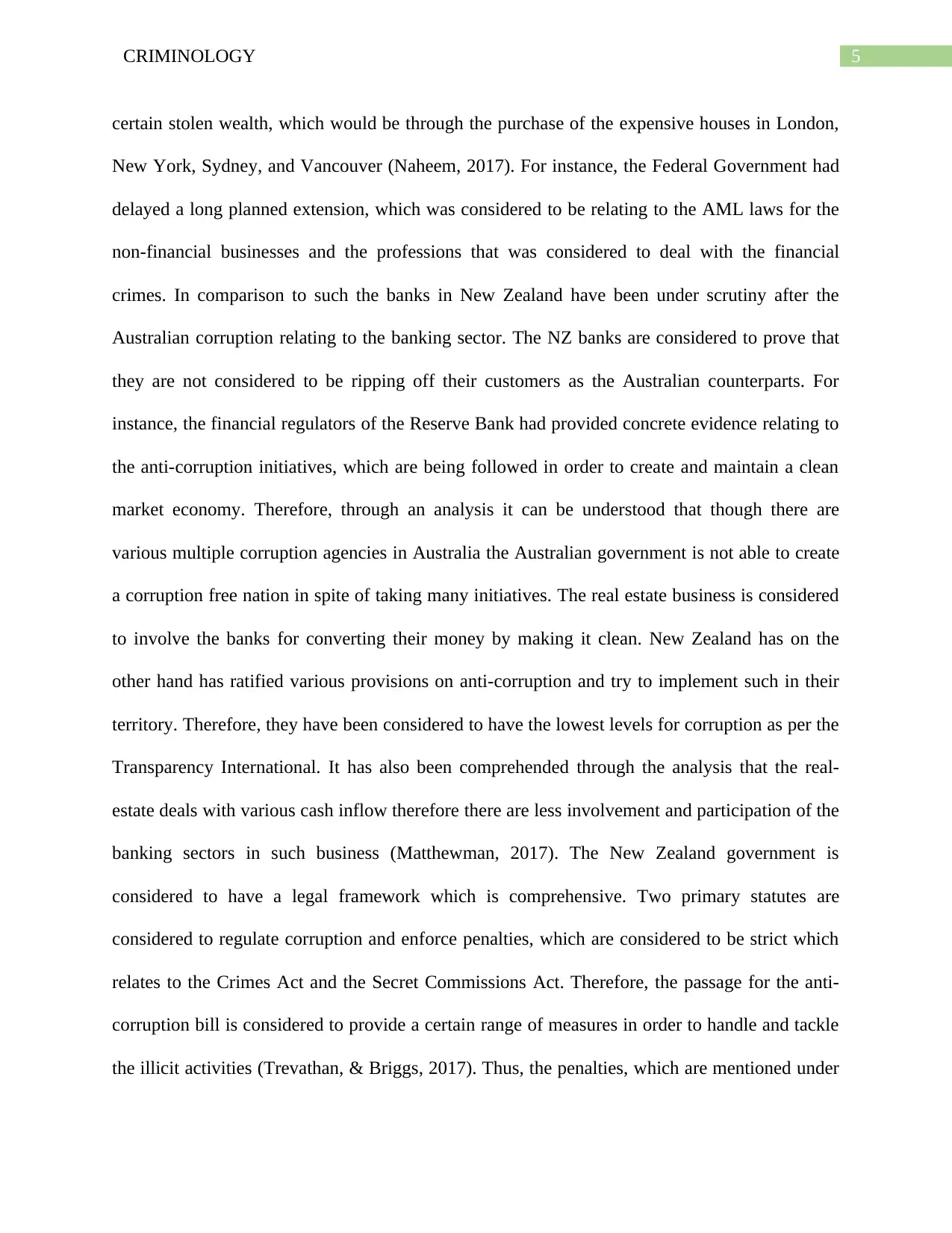
5CRIMINOLOGY
certain stolen wealth, which would be through the purchase of the expensive houses in London,
New York, Sydney, and Vancouver (Naheem, 2017). For instance, the Federal Government had
delayed a long planned extension, which was considered to be relating to the AML laws for the
non-financial businesses and the professions that was considered to deal with the financial
crimes. In comparison to such the banks in New Zealand have been under scrutiny after the
Australian corruption relating to the banking sector. The NZ banks are considered to prove that
they are not considered to be ripping off their customers as the Australian counterparts. For
instance, the financial regulators of the Reserve Bank had provided concrete evidence relating to
the anti-corruption initiatives, which are being followed in order to create and maintain a clean
market economy. Therefore, through an analysis it can be understood that though there are
various multiple corruption agencies in Australia the Australian government is not able to create
a corruption free nation in spite of taking many initiatives. The real estate business is considered
to involve the banks for converting their money by making it clean. New Zealand has on the
other hand has ratified various provisions on anti-corruption and try to implement such in their
territory. Therefore, they have been considered to have the lowest levels for corruption as per the
Transparency International. It has also been comprehended through the analysis that the real-
estate deals with various cash inflow therefore there are less involvement and participation of the
banking sectors in such business (Matthewman, 2017). The New Zealand government is
considered to have a legal framework which is comprehensive. Two primary statutes are
considered to regulate corruption and enforce penalties, which are considered to be strict which
relates to the Crimes Act and the Secret Commissions Act. Therefore, the passage for the anti-
corruption bill is considered to provide a certain range of measures in order to handle and tackle
the illicit activities (Trevathan, & Briggs, 2017). Thus, the penalties, which are mentioned under
certain stolen wealth, which would be through the purchase of the expensive houses in London,
New York, Sydney, and Vancouver (Naheem, 2017). For instance, the Federal Government had
delayed a long planned extension, which was considered to be relating to the AML laws for the
non-financial businesses and the professions that was considered to deal with the financial
crimes. In comparison to such the banks in New Zealand have been under scrutiny after the
Australian corruption relating to the banking sector. The NZ banks are considered to prove that
they are not considered to be ripping off their customers as the Australian counterparts. For
instance, the financial regulators of the Reserve Bank had provided concrete evidence relating to
the anti-corruption initiatives, which are being followed in order to create and maintain a clean
market economy. Therefore, through an analysis it can be understood that though there are
various multiple corruption agencies in Australia the Australian government is not able to create
a corruption free nation in spite of taking many initiatives. The real estate business is considered
to involve the banks for converting their money by making it clean. New Zealand has on the
other hand has ratified various provisions on anti-corruption and try to implement such in their
territory. Therefore, they have been considered to have the lowest levels for corruption as per the
Transparency International. It has also been comprehended through the analysis that the real-
estate deals with various cash inflow therefore there are less involvement and participation of the
banking sectors in such business (Matthewman, 2017). The New Zealand government is
considered to have a legal framework which is comprehensive. Two primary statutes are
considered to regulate corruption and enforce penalties, which are considered to be strict which
relates to the Crimes Act and the Secret Commissions Act. Therefore, the passage for the anti-
corruption bill is considered to provide a certain range of measures in order to handle and tackle
the illicit activities (Trevathan, & Briggs, 2017). Thus, the penalties, which are mentioned under
⊘ This is a preview!⊘
Do you want full access?
Subscribe today to unlock all pages.

Trusted by 1+ million students worldwide
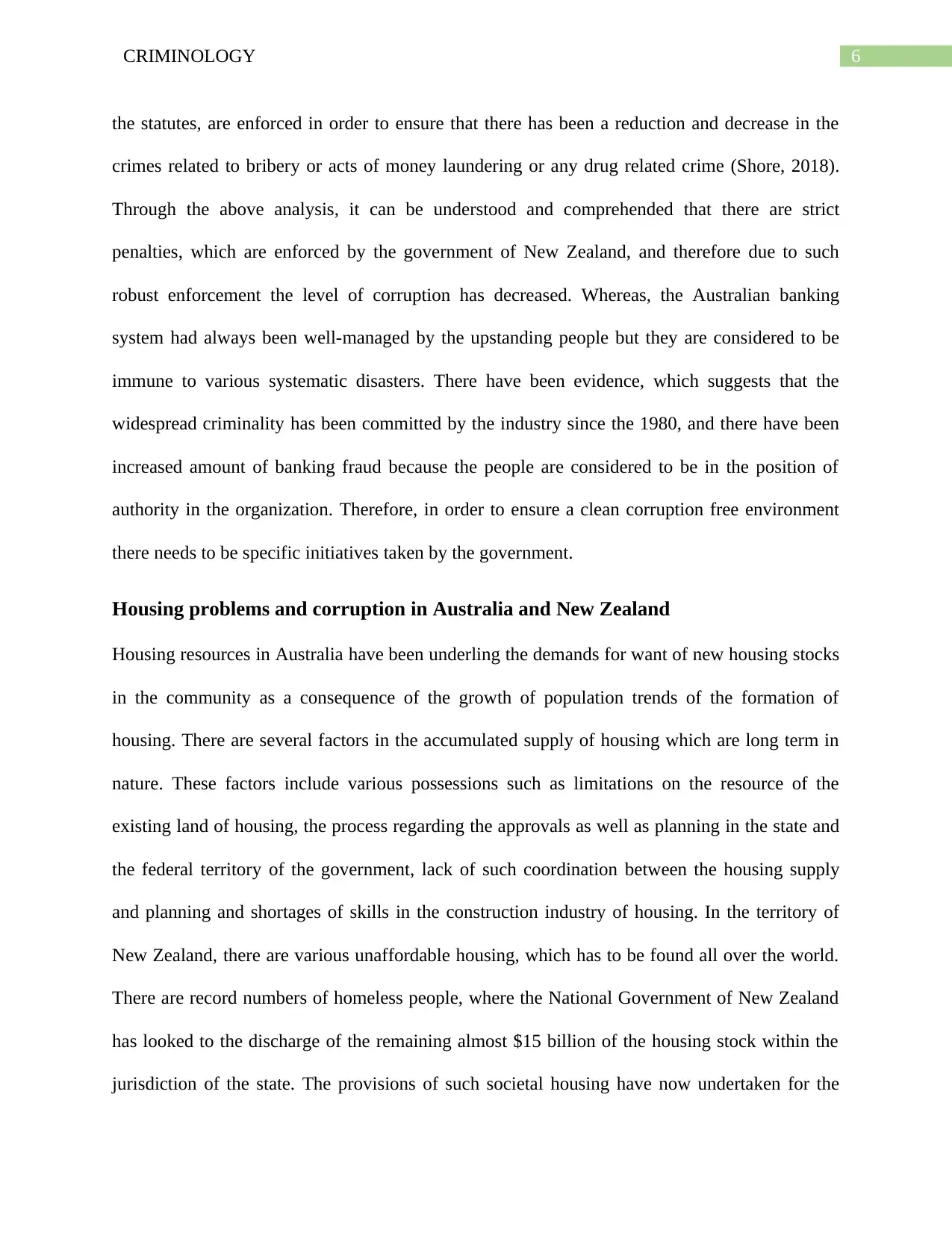
6CRIMINOLOGY
the statutes, are enforced in order to ensure that there has been a reduction and decrease in the
crimes related to bribery or acts of money laundering or any drug related crime (Shore, 2018).
Through the above analysis, it can be understood and comprehended that there are strict
penalties, which are enforced by the government of New Zealand, and therefore due to such
robust enforcement the level of corruption has decreased. Whereas, the Australian banking
system had always been well-managed by the upstanding people but they are considered to be
immune to various systematic disasters. There have been evidence, which suggests that the
widespread criminality has been committed by the industry since the 1980, and there have been
increased amount of banking fraud because the people are considered to be in the position of
authority in the organization. Therefore, in order to ensure a clean corruption free environment
there needs to be specific initiatives taken by the government.
Housing problems and corruption in Australia and New Zealand
Housing resources in Australia have been underling the demands for want of new housing stocks
in the community as a consequence of the growth of population trends of the formation of
housing. There are several factors in the accumulated supply of housing which are long term in
nature. These factors include various possessions such as limitations on the resource of the
existing land of housing, the process regarding the approvals as well as planning in the state and
the federal territory of the government, lack of such coordination between the housing supply
and planning and shortages of skills in the construction industry of housing. In the territory of
New Zealand, there are various unaffordable housing, which has to be found all over the world.
There are record numbers of homeless people, where the National Government of New Zealand
has looked to the discharge of the remaining almost $15 billion of the housing stock within the
jurisdiction of the state. The provisions of such societal housing have now undertaken for the
the statutes, are enforced in order to ensure that there has been a reduction and decrease in the
crimes related to bribery or acts of money laundering or any drug related crime (Shore, 2018).
Through the above analysis, it can be understood and comprehended that there are strict
penalties, which are enforced by the government of New Zealand, and therefore due to such
robust enforcement the level of corruption has decreased. Whereas, the Australian banking
system had always been well-managed by the upstanding people but they are considered to be
immune to various systematic disasters. There have been evidence, which suggests that the
widespread criminality has been committed by the industry since the 1980, and there have been
increased amount of banking fraud because the people are considered to be in the position of
authority in the organization. Therefore, in order to ensure a clean corruption free environment
there needs to be specific initiatives taken by the government.
Housing problems and corruption in Australia and New Zealand
Housing resources in Australia have been underling the demands for want of new housing stocks
in the community as a consequence of the growth of population trends of the formation of
housing. There are several factors in the accumulated supply of housing which are long term in
nature. These factors include various possessions such as limitations on the resource of the
existing land of housing, the process regarding the approvals as well as planning in the state and
the federal territory of the government, lack of such coordination between the housing supply
and planning and shortages of skills in the construction industry of housing. In the territory of
New Zealand, there are various unaffordable housing, which has to be found all over the world.
There are record numbers of homeless people, where the National Government of New Zealand
has looked to the discharge of the remaining almost $15 billion of the housing stock within the
jurisdiction of the state. The provisions of such societal housing have now undertaken for the
Paraphrase This Document
Need a fresh take? Get an instant paraphrase of this document with our AI Paraphraser
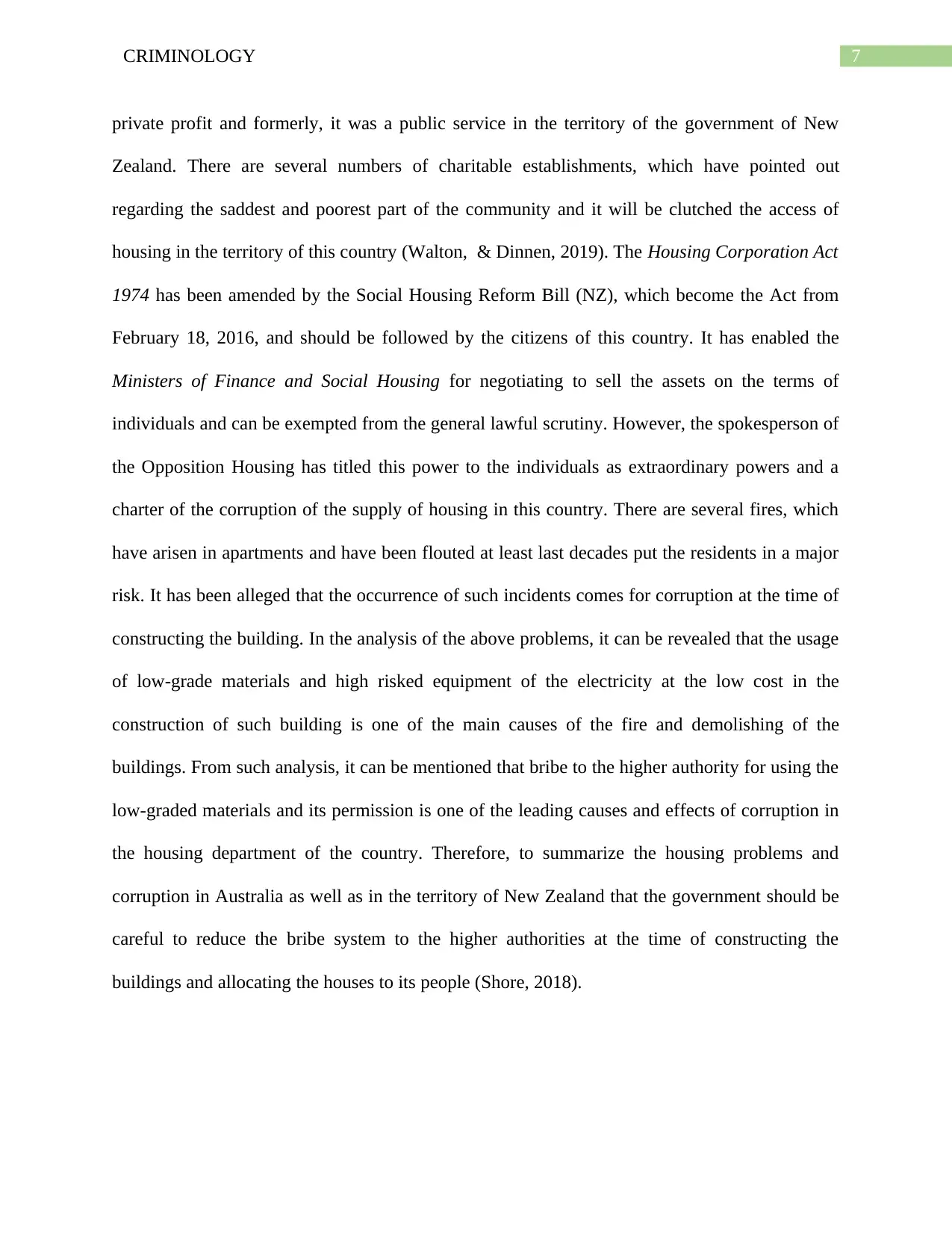
7CRIMINOLOGY
private profit and formerly, it was a public service in the territory of the government of New
Zealand. There are several numbers of charitable establishments, which have pointed out
regarding the saddest and poorest part of the community and it will be clutched the access of
housing in the territory of this country (Walton, & Dinnen, 2019). The Housing Corporation Act
1974 has been amended by the Social Housing Reform Bill (NZ), which become the Act from
February 18, 2016, and should be followed by the citizens of this country. It has enabled the
Ministers of Finance and Social Housing for negotiating to sell the assets on the terms of
individuals and can be exempted from the general lawful scrutiny. However, the spokesperson of
the Opposition Housing has titled this power to the individuals as extraordinary powers and a
charter of the corruption of the supply of housing in this country. There are several fires, which
have arisen in apartments and have been flouted at least last decades put the residents in a major
risk. It has been alleged that the occurrence of such incidents comes for corruption at the time of
constructing the building. In the analysis of the above problems, it can be revealed that the usage
of low-grade materials and high risked equipment of the electricity at the low cost in the
construction of such building is one of the main causes of the fire and demolishing of the
buildings. From such analysis, it can be mentioned that bribe to the higher authority for using the
low-graded materials and its permission is one of the leading causes and effects of corruption in
the housing department of the country. Therefore, to summarize the housing problems and
corruption in Australia as well as in the territory of New Zealand that the government should be
careful to reduce the bribe system to the higher authorities at the time of constructing the
buildings and allocating the houses to its people (Shore, 2018).
private profit and formerly, it was a public service in the territory of the government of New
Zealand. There are several numbers of charitable establishments, which have pointed out
regarding the saddest and poorest part of the community and it will be clutched the access of
housing in the territory of this country (Walton, & Dinnen, 2019). The Housing Corporation Act
1974 has been amended by the Social Housing Reform Bill (NZ), which become the Act from
February 18, 2016, and should be followed by the citizens of this country. It has enabled the
Ministers of Finance and Social Housing for negotiating to sell the assets on the terms of
individuals and can be exempted from the general lawful scrutiny. However, the spokesperson of
the Opposition Housing has titled this power to the individuals as extraordinary powers and a
charter of the corruption of the supply of housing in this country. There are several fires, which
have arisen in apartments and have been flouted at least last decades put the residents in a major
risk. It has been alleged that the occurrence of such incidents comes for corruption at the time of
constructing the building. In the analysis of the above problems, it can be revealed that the usage
of low-grade materials and high risked equipment of the electricity at the low cost in the
construction of such building is one of the main causes of the fire and demolishing of the
buildings. From such analysis, it can be mentioned that bribe to the higher authority for using the
low-graded materials and its permission is one of the leading causes and effects of corruption in
the housing department of the country. Therefore, to summarize the housing problems and
corruption in Australia as well as in the territory of New Zealand that the government should be
careful to reduce the bribe system to the higher authorities at the time of constructing the
buildings and allocating the houses to its people (Shore, 2018).
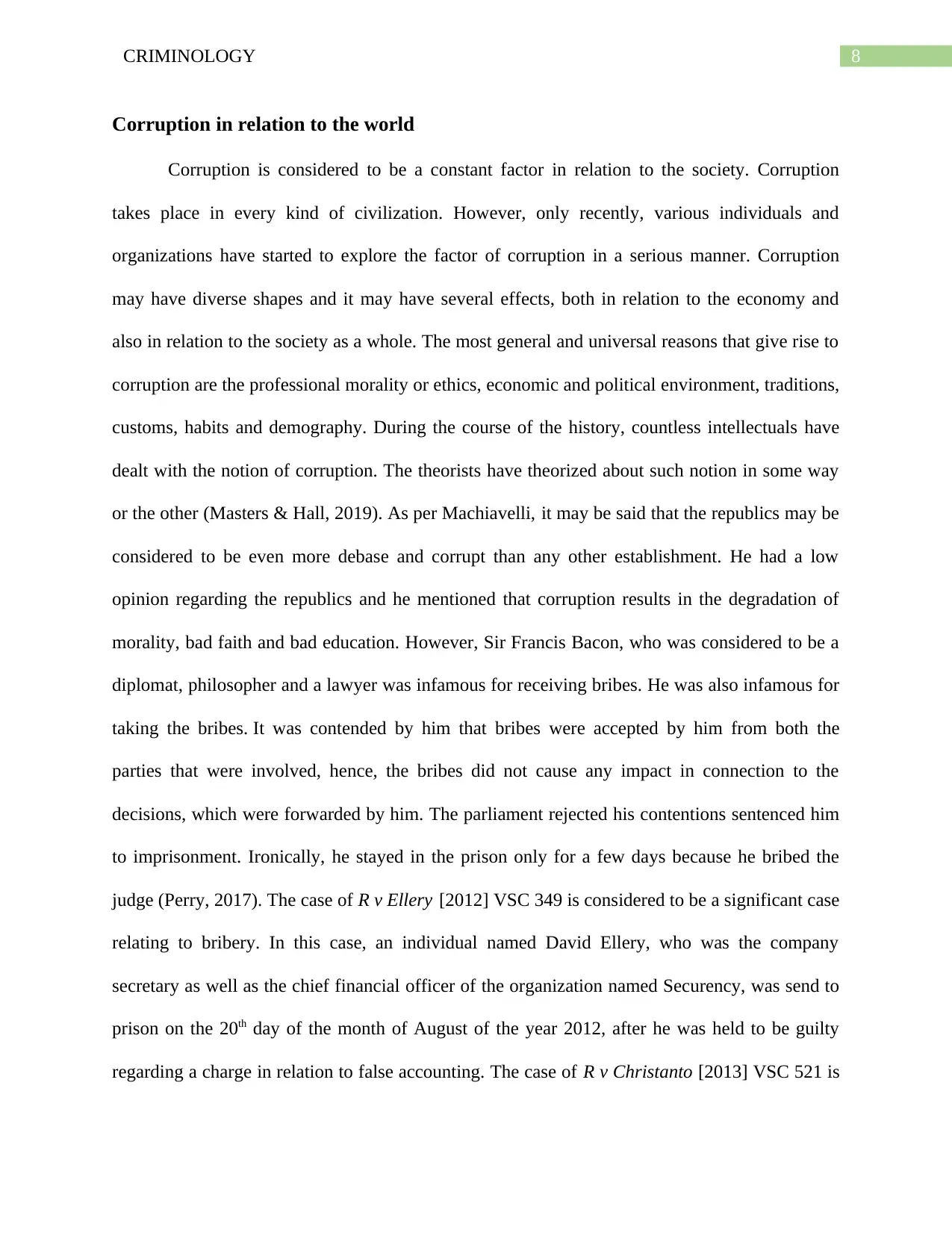
8CRIMINOLOGY
Corruption in relation to the world
Corruption is considered to be a constant factor in relation to the society. Corruption
takes place in every kind of civilization. However, only recently, various individuals and
organizations have started to explore the factor of corruption in a serious manner. Corruption
may have diverse shapes and it may have several effects, both in relation to the economy and
also in relation to the society as a whole. The most general and universal reasons that give rise to
corruption are the professional morality or ethics, economic and political environment, traditions,
customs, habits and demography. During the course of the history, countless intellectuals have
dealt with the notion of corruption. The theorists have theorized about such notion in some way
or the other (Masters & Hall, 2019). As per Machiavelli, it may be said that the republics may be
considered to be even more debase and corrupt than any other establishment. He had a low
opinion regarding the republics and he mentioned that corruption results in the degradation of
morality, bad faith and bad education. However, Sir Francis Bacon, who was considered to be a
diplomat, philosopher and a lawyer was infamous for receiving bribes. He was also infamous for
taking the bribes. It was contended by him that bribes were accepted by him from both the
parties that were involved, hence, the bribes did not cause any impact in connection to the
decisions, which were forwarded by him. The parliament rejected his contentions sentenced him
to imprisonment. Ironically, he stayed in the prison only for a few days because he bribed the
judge (Perry, 2017). The case of R v Ellery [2012] VSC 349 is considered to be a significant case
relating to bribery. In this case, an individual named David Ellery, who was the company
secretary as well as the chief financial officer of the organization named Securency, was send to
prison on the 20th day of the month of August of the year 2012, after he was held to be guilty
regarding a charge in relation to false accounting. The case of R v Christanto [2013] VSC 521 is
Corruption in relation to the world
Corruption is considered to be a constant factor in relation to the society. Corruption
takes place in every kind of civilization. However, only recently, various individuals and
organizations have started to explore the factor of corruption in a serious manner. Corruption
may have diverse shapes and it may have several effects, both in relation to the economy and
also in relation to the society as a whole. The most general and universal reasons that give rise to
corruption are the professional morality or ethics, economic and political environment, traditions,
customs, habits and demography. During the course of the history, countless intellectuals have
dealt with the notion of corruption. The theorists have theorized about such notion in some way
or the other (Masters & Hall, 2019). As per Machiavelli, it may be said that the republics may be
considered to be even more debase and corrupt than any other establishment. He had a low
opinion regarding the republics and he mentioned that corruption results in the degradation of
morality, bad faith and bad education. However, Sir Francis Bacon, who was considered to be a
diplomat, philosopher and a lawyer was infamous for receiving bribes. He was also infamous for
taking the bribes. It was contended by him that bribes were accepted by him from both the
parties that were involved, hence, the bribes did not cause any impact in connection to the
decisions, which were forwarded by him. The parliament rejected his contentions sentenced him
to imprisonment. Ironically, he stayed in the prison only for a few days because he bribed the
judge (Perry, 2017). The case of R v Ellery [2012] VSC 349 is considered to be a significant case
relating to bribery. In this case, an individual named David Ellery, who was the company
secretary as well as the chief financial officer of the organization named Securency, was send to
prison on the 20th day of the month of August of the year 2012, after he was held to be guilty
regarding a charge in relation to false accounting. The case of R v Christanto [2013] VSC 521 is
⊘ This is a preview!⊘
Do you want full access?
Subscribe today to unlock all pages.

Trusted by 1+ million students worldwide
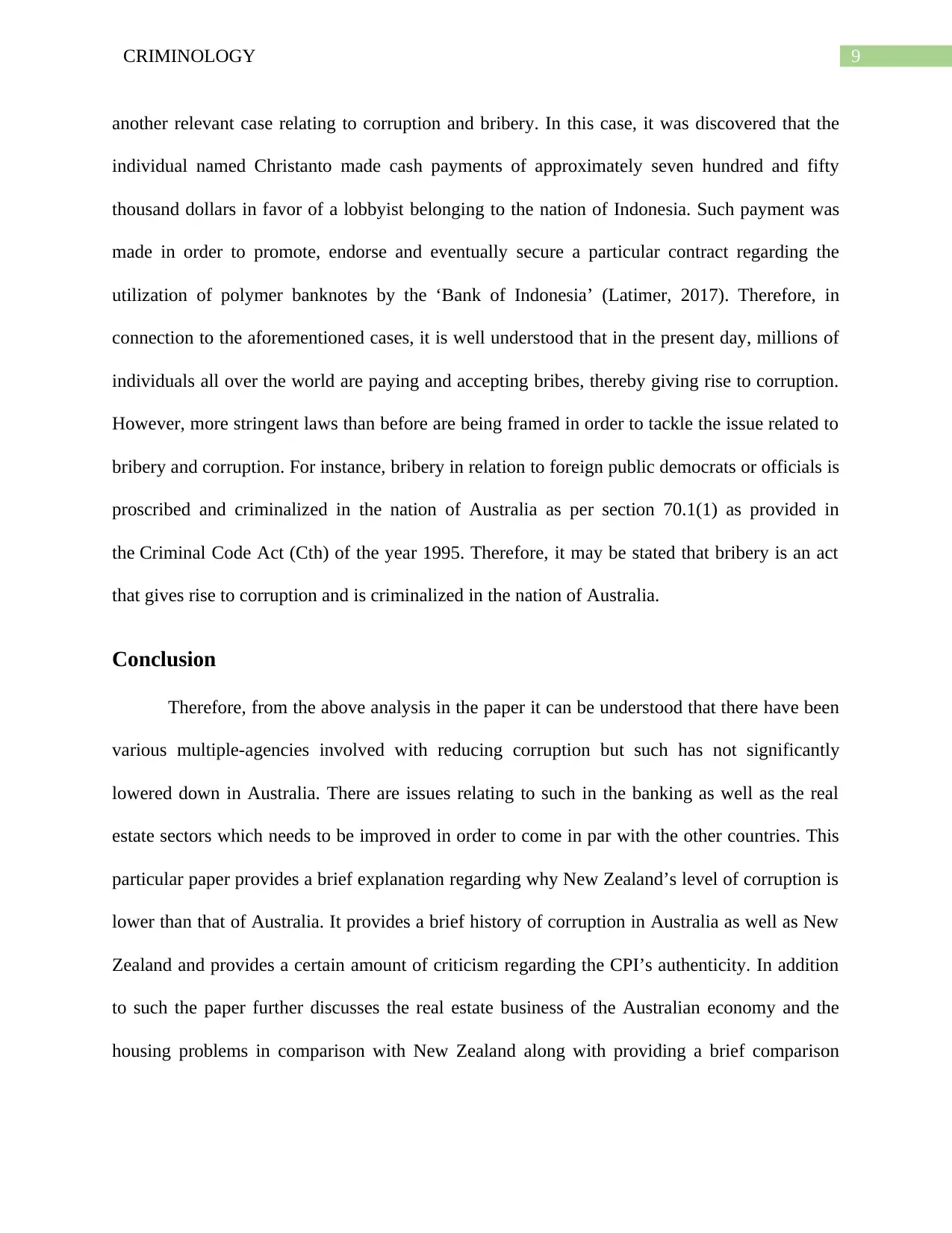
9CRIMINOLOGY
another relevant case relating to corruption and bribery. In this case, it was discovered that the
individual named Christanto made cash payments of approximately seven hundred and fifty
thousand dollars in favor of a lobbyist belonging to the nation of Indonesia. Such payment was
made in order to promote, endorse and eventually secure a particular contract regarding the
utilization of polymer banknotes by the ‘Bank of Indonesia’ (Latimer, 2017). Therefore, in
connection to the aforementioned cases, it is well understood that in the present day, millions of
individuals all over the world are paying and accepting bribes, thereby giving rise to corruption.
However, more stringent laws than before are being framed in order to tackle the issue related to
bribery and corruption. For instance, bribery in relation to foreign public democrats or officials is
proscribed and criminalized in the nation of Australia as per section 70.1(1) as provided in
the Criminal Code Act (Cth) of the year 1995. Therefore, it may be stated that bribery is an act
that gives rise to corruption and is criminalized in the nation of Australia.
Conclusion
Therefore, from the above analysis in the paper it can be understood that there have been
various multiple-agencies involved with reducing corruption but such has not significantly
lowered down in Australia. There are issues relating to such in the banking as well as the real
estate sectors which needs to be improved in order to come in par with the other countries. This
particular paper provides a brief explanation regarding why New Zealand’s level of corruption is
lower than that of Australia. It provides a brief history of corruption in Australia as well as New
Zealand and provides a certain amount of criticism regarding the CPI’s authenticity. In addition
to such the paper further discusses the real estate business of the Australian economy and the
housing problems in comparison with New Zealand along with providing a brief comparison
another relevant case relating to corruption and bribery. In this case, it was discovered that the
individual named Christanto made cash payments of approximately seven hundred and fifty
thousand dollars in favor of a lobbyist belonging to the nation of Indonesia. Such payment was
made in order to promote, endorse and eventually secure a particular contract regarding the
utilization of polymer banknotes by the ‘Bank of Indonesia’ (Latimer, 2017). Therefore, in
connection to the aforementioned cases, it is well understood that in the present day, millions of
individuals all over the world are paying and accepting bribes, thereby giving rise to corruption.
However, more stringent laws than before are being framed in order to tackle the issue related to
bribery and corruption. For instance, bribery in relation to foreign public democrats or officials is
proscribed and criminalized in the nation of Australia as per section 70.1(1) as provided in
the Criminal Code Act (Cth) of the year 1995. Therefore, it may be stated that bribery is an act
that gives rise to corruption and is criminalized in the nation of Australia.
Conclusion
Therefore, from the above analysis in the paper it can be understood that there have been
various multiple-agencies involved with reducing corruption but such has not significantly
lowered down in Australia. There are issues relating to such in the banking as well as the real
estate sectors which needs to be improved in order to come in par with the other countries. This
particular paper provides a brief explanation regarding why New Zealand’s level of corruption is
lower than that of Australia. It provides a brief history of corruption in Australia as well as New
Zealand and provides a certain amount of criticism regarding the CPI’s authenticity. In addition
to such the paper further discusses the real estate business of the Australian economy and the
housing problems in comparison with New Zealand along with providing a brief comparison
Paraphrase This Document
Need a fresh take? Get an instant paraphrase of this document with our AI Paraphraser
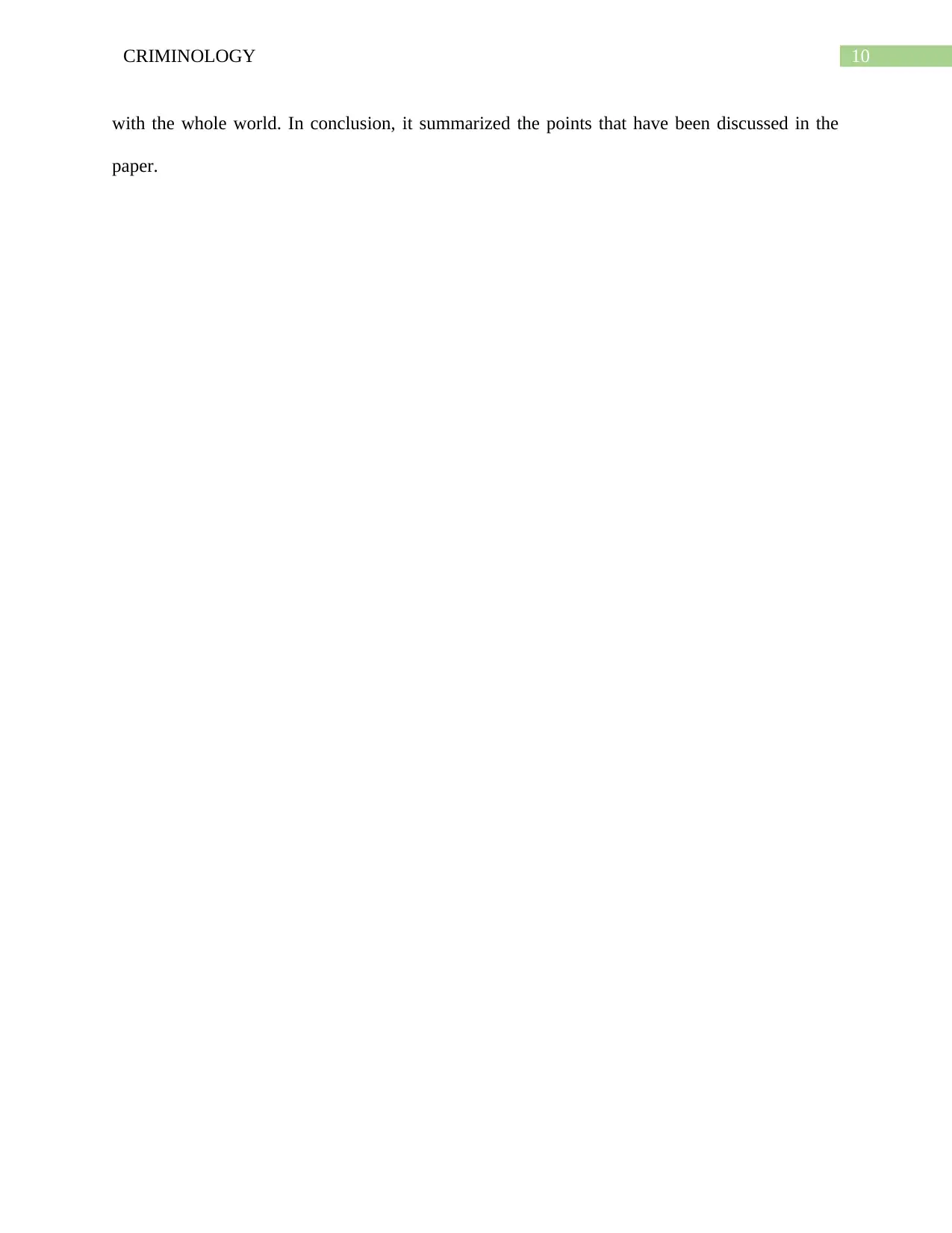
10CRIMINOLOGY
with the whole world. In conclusion, it summarized the points that have been discussed in the
paper.
with the whole world. In conclusion, it summarized the points that have been discussed in the
paper.
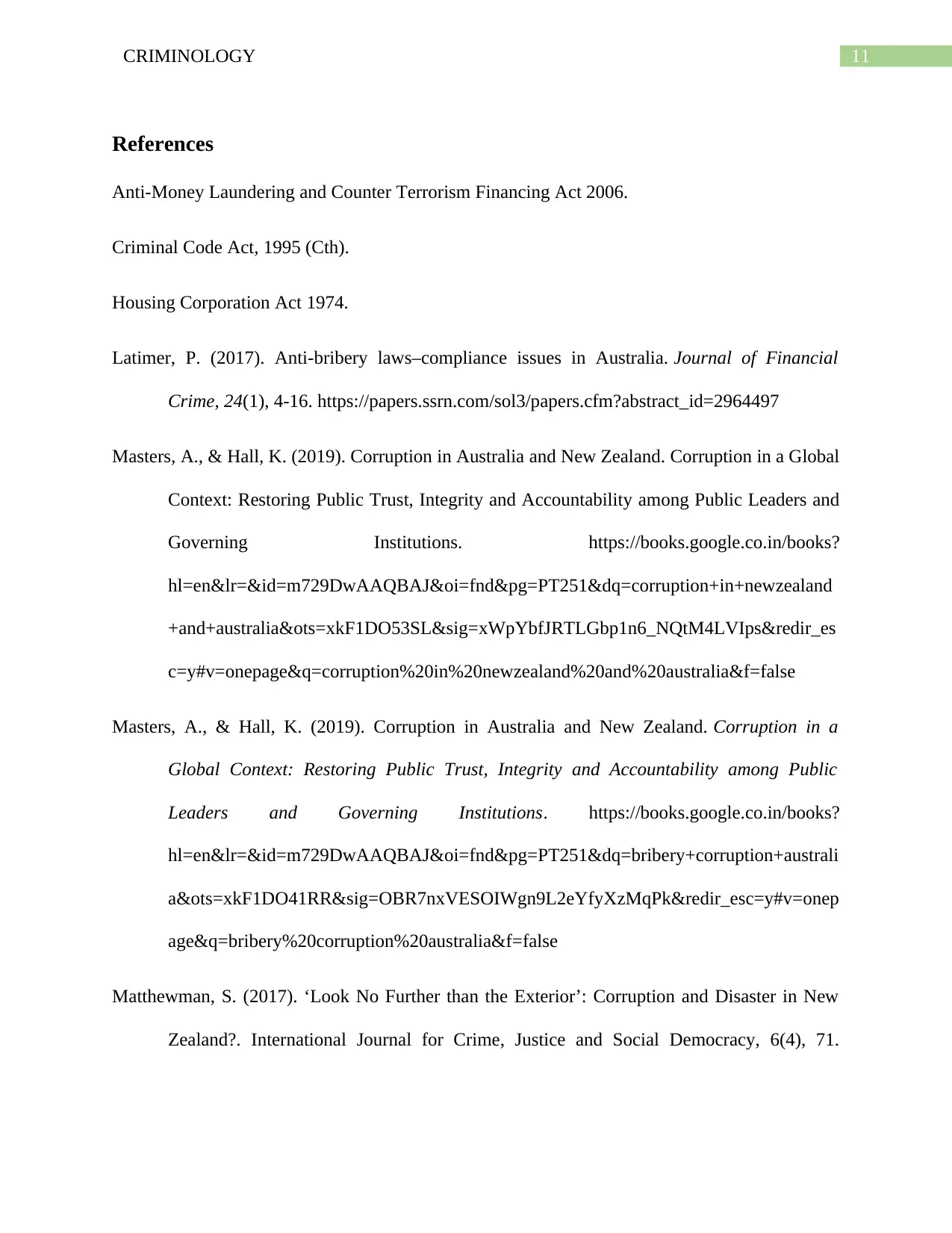
11CRIMINOLOGY
References
Anti-Money Laundering and Counter Terrorism Financing Act 2006.
Criminal Code Act, 1995 (Cth).
Housing Corporation Act 1974.
Latimer, P. (2017). Anti-bribery laws–compliance issues in Australia. Journal of Financial
Crime, 24(1), 4-16. https://papers.ssrn.com/sol3/papers.cfm?abstract_id=2964497
Masters, A., & Hall, K. (2019). Corruption in Australia and New Zealand. Corruption in a Global
Context: Restoring Public Trust, Integrity and Accountability among Public Leaders and
Governing Institutions. https://books.google.co.in/books?
hl=en&lr=&id=m729DwAAQBAJ&oi=fnd&pg=PT251&dq=corruption+in+newzealand
+and+australia&ots=xkF1DO53SL&sig=xWpYbfJRTLGbp1n6_NQtM4LVIps&redir_es
c=y#v=onepage&q=corruption%20in%20newzealand%20and%20australia&f=false
Masters, A., & Hall, K. (2019). Corruption in Australia and New Zealand. Corruption in a
Global Context: Restoring Public Trust, Integrity and Accountability among Public
Leaders and Governing Institutions. https://books.google.co.in/books?
hl=en&lr=&id=m729DwAAQBAJ&oi=fnd&pg=PT251&dq=bribery+corruption+australi
a&ots=xkF1DO41RR&sig=OBR7nxVESOIWgn9L2eYfyXzMqPk&redir_esc=y#v=onep
age&q=bribery%20corruption%20australia&f=false
Matthewman, S. (2017). ‘Look No Further than the Exterior’: Corruption and Disaster in New
Zealand?. International Journal for Crime, Justice and Social Democracy, 6(4), 71.
References
Anti-Money Laundering and Counter Terrorism Financing Act 2006.
Criminal Code Act, 1995 (Cth).
Housing Corporation Act 1974.
Latimer, P. (2017). Anti-bribery laws–compliance issues in Australia. Journal of Financial
Crime, 24(1), 4-16. https://papers.ssrn.com/sol3/papers.cfm?abstract_id=2964497
Masters, A., & Hall, K. (2019). Corruption in Australia and New Zealand. Corruption in a Global
Context: Restoring Public Trust, Integrity and Accountability among Public Leaders and
Governing Institutions. https://books.google.co.in/books?
hl=en&lr=&id=m729DwAAQBAJ&oi=fnd&pg=PT251&dq=corruption+in+newzealand
+and+australia&ots=xkF1DO53SL&sig=xWpYbfJRTLGbp1n6_NQtM4LVIps&redir_es
c=y#v=onepage&q=corruption%20in%20newzealand%20and%20australia&f=false
Masters, A., & Hall, K. (2019). Corruption in Australia and New Zealand. Corruption in a
Global Context: Restoring Public Trust, Integrity and Accountability among Public
Leaders and Governing Institutions. https://books.google.co.in/books?
hl=en&lr=&id=m729DwAAQBAJ&oi=fnd&pg=PT251&dq=bribery+corruption+australi
a&ots=xkF1DO41RR&sig=OBR7nxVESOIWgn9L2eYfyXzMqPk&redir_esc=y#v=onep
age&q=bribery%20corruption%20australia&f=false
Matthewman, S. (2017). ‘Look No Further than the Exterior’: Corruption and Disaster in New
Zealand?. International Journal for Crime, Justice and Social Democracy, 6(4), 71.
⊘ This is a preview!⊘
Do you want full access?
Subscribe today to unlock all pages.

Trusted by 1+ million students worldwide
1 out of 14
Related Documents
Your All-in-One AI-Powered Toolkit for Academic Success.
+13062052269
info@desklib.com
Available 24*7 on WhatsApp / Email
![[object Object]](/_next/static/media/star-bottom.7253800d.svg)
Unlock your academic potential
Copyright © 2020–2026 A2Z Services. All Rights Reserved. Developed and managed by ZUCOL.





